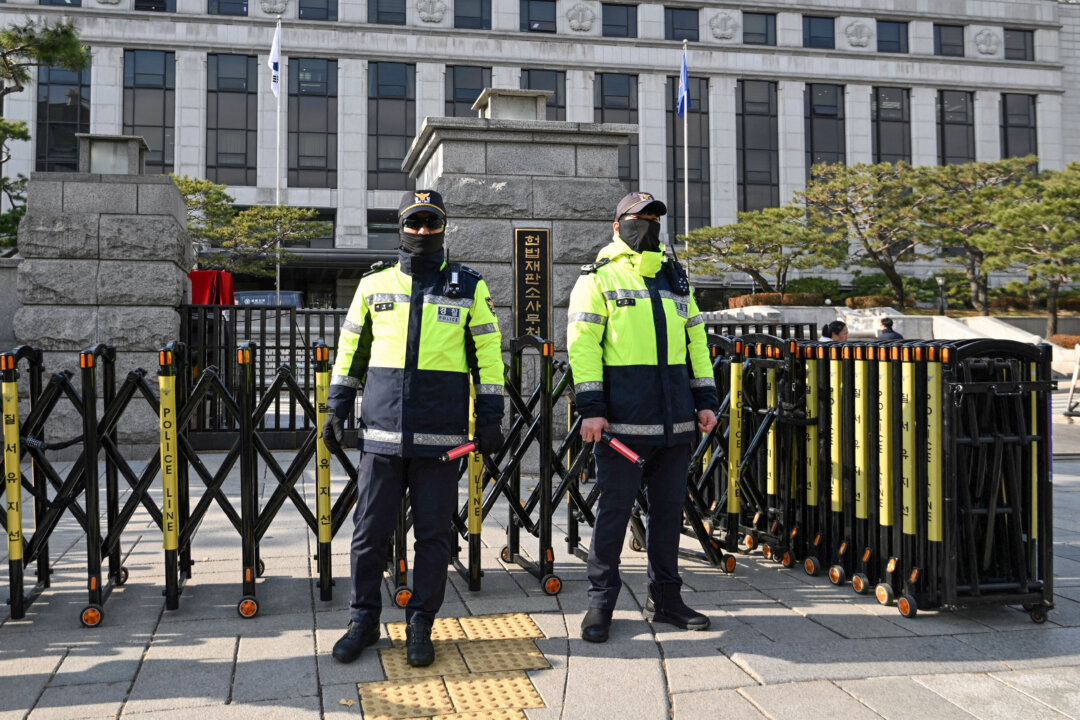The court has up to six months to deliberate on whether to remove Yoon from office or reinstate him.
South Korea’s Constitutional Court on Dec. 16 began reviewing the impeachment of President Yoon Suk Yeol over his short-lived martial law declaration on Dec. 3, according to local reports.
Yoon has been suspended from official duties after the opposition-led National Assembly voted to impeach him on Dec. 14, with Prime Minister Han Duck-soo stepping in as acting president.
The National Assembly passed the motion 204–85 in the Dec. 14 floor vote.
The first vote for Yoon’s impeachment on Dec. 7 failed after most members of the ruling party boycotted the vote, denying the two-thirds majority in the 300-member Parliament needed to suspend his presidential powers.
Six justices of the Constitutional Court convened for the first time on Dec. 16 to set hearing dates and proceedings for reviewing evidence relating to the case, South Korea’s Yonhap News Agency reported.
The court has up to six months to deliberate on whether to remove Yoon from office or reinstate him. His removal would trigger a snap election within 60 days.
Han Dong-hoon, leader of Yoon’s People Power Party, announced on Dec. 16 that he would step down from his role, saying the “collapse” of the party’s Supreme Council renders it untenable for him to continue leading.
Han, who had backed calls to impeach Yoon, initially vowed to remain in his position but faced growing pressure to resign after five elected members of the party expressed their intentions to quit.
Prosecutors have opened a treason investigation into Yoon, his interior minister, and the defense minister—who has since been replaced—over their alleged roles in the attempt to impose martial law, according to local reports.
On Dec. 16, prosecutors summoned Yoon for a second time after he failed to appear for questioning on Dec. 15. Yonhap reported that Yoon was still in the process of assembling his legal team.In a national address on Dec. 11, Yoon defended his declaration of martial law, saying it was meant to protect the country’s democracy and serve as a warning to opposition parties, which he accused of sympathizing with North Korea and paralyzing state affairs by impeaching top officials.
“We must prevent the forces and criminal groups that have paralyzed state affairs and breached the constitution to date from taking control of state affairs and threatening the future of the Republic of Korea at all costs,” he said. “I will fight till the end.”
Yoon said the declaration did not amount to insurrection and that the deployment of unarmed troops was intended to maintain order, not to block lawmakers from entering the Parliament building.
“I did not block National Assembly members and staff from entering the Assembly. That is why lawmakers and a huge crowd were able to enter the National Assembly grounds, the main building, and the plenary chamber, and why the deliberation about lifting martial law was able to be conducted,” he said. “And yet, somehow, there are those who have managed to greatly incite others erroneously by fabricating charges of insurrection designed to bring me down. … Is it a revolt if you deploy a small number of troops briefly to maintain order?”
The surprise declaration of martial law late on Dec. 3 led to a standoff with lawmakers, who rejected Yoon’s attempt to impose a ban on political activity and censor independent media and publications.
Some 280 troops were reportedly deployed following the decree to secure the National Assembly Building in Seoul. Yoon rescinded the decree six hours after the National Assembly unanimously passed a motion to lift it.
Katabella Roberts and Reuters contributed to this report.

